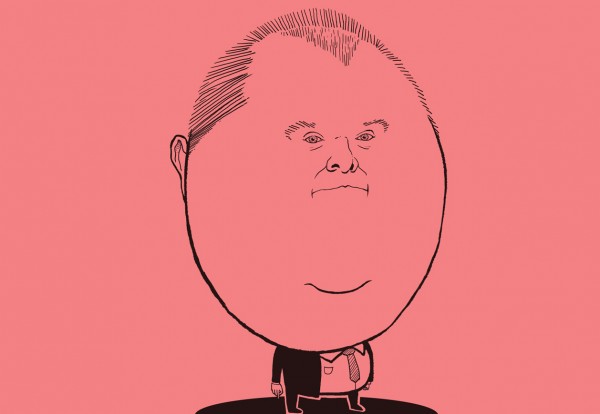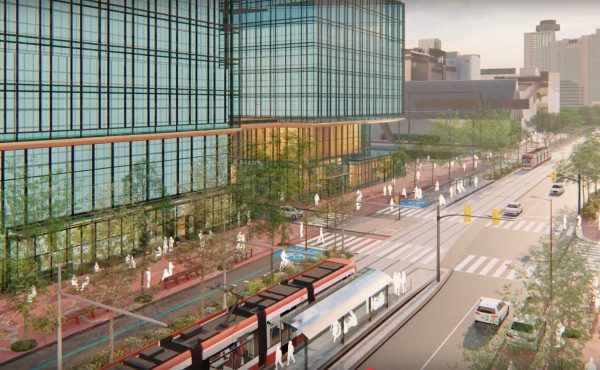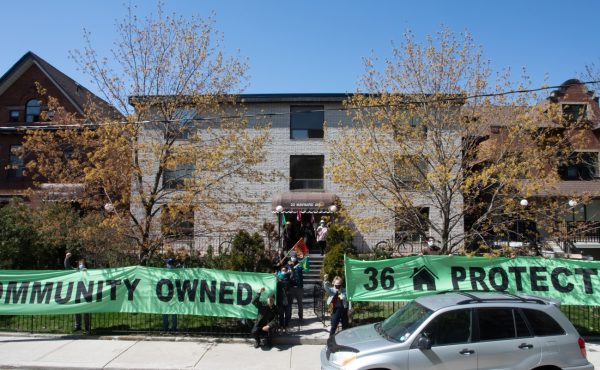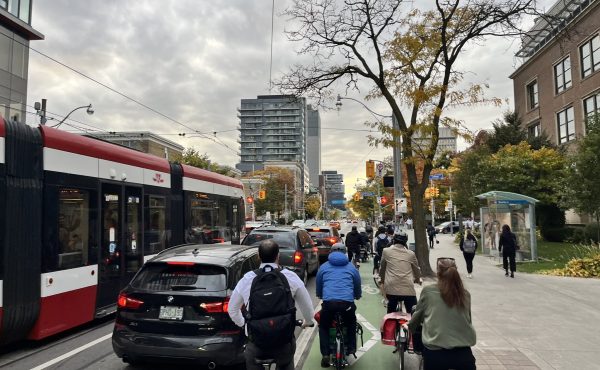On the first day of September, 2010, news reports about Toronto’s mayoralty race were dominated by matters both trivial and disconcertingly prescient. George Smitherman and Sarah Thomson complained about not getting invited to the Labour Day parade. Rocco Rossi, meanwhile, was trying to rekindle his sputtering campaign with a proposal to pass voter recall laws, an idea supported by none other than candidate Rob Ford. (A small sample poll found 73% of voters approved!)
But the main event began after Labour Day. At a press conference in the Sheraton that week, Smitherman unveiled a conspicuously conservative fiscal plan. A few days later, Ford posted his transportation platform on YouTube, the crux of which was a pledge to build a Sheppard subway down to the Scarborough Town Centre to “close the loop.” Oh yes, and cancel Transit City.
There’s an old and somewhat misleading trope that in Toronto politics, the real campaign doesn’t begin until after Labour Day because that’s when voters start to pay attention. Do they? The reality, back in 2010, was that Smitherman was a dead man walking by the beginning of September. Ford had taken a firm lead in the polls in June, precipitating an internal crisis in the Smitherman camp. Some of his advisors wanted him to tack left, others felt he should go right.
As with the 2008 global credit crisis — which only a handful of professionally pessimistic economists predicted before it was too late — just a few political insiders believed that a Ford victory in 2010 was within the realm of possibility.
There was a lot of denial. Many people — myself included — reckoned that Smitherman and his impeccably well connected, lavishly financed campaign team would succeed in arresting Ford’s ascendency before it was too late. Insiders figured that during the final two months, with the intensive scrutiny that adheres in the final laps, a sufficient number of voters would wake up to the disaster of a Ford victory and come to their senses.
Within the Smitherman camp, however, a growing number of his advisors arrived at the Labour Day turning point with a queasy feeling. Pollster Michael Marzollini’s view, which prevailed, was that Smitherman needed to move sharply right, and demonstrate that he wasn’t going to be some kind of tax-happy Liberal planning to spend like a drunken sailor (sound familiar?). Smitherman pledged to bird-dog a vigorous cost-cutting campaign, freeze taxes for a year, cancel the vehicle registration tax (even Joe Pantalone promised that too) and underwrite his transit plan using a mysterious financing formula that seemed to involve the private sector.
But his attempt to out-Ford Ford proved to be an epic disaster. No one bought it, partly because Smitherman was never especially convincing as an advocate of red meat conservatism. Why buy hamburger if it’s steak that you want?
The latest Forum poll once again raises the chilly spectre of denial, as well as Ford’s uncanny ability to capitalize on the disbelief of those who are paid to chart a path across the sprawling geography of our civic discontent.
It seems like just yesterday that we were listening to John Tory’s spin doctors confidently state, in background interviews, that Ford has “no room to grow” beyond the 20-odd percent of Toronto voters who would support a washing machine if it pledged to freeze taxes. Well, it seems he grew.
How often did we hear the Olivia Chow camp, and assorted pollsters, assure us that in a head-to-head fight, Chow takes Ford without breaking a sweat. As recently as last week, her campaign manager John Laschinger sent out an email, in the wake of the Forum poll, reiterating his fervent belief that all Chow has to do to win is split the right. But what if the reality is the converse? What if the prevailing dynamic of this election, like the last one, is that Ford splits the centre/left?
And what about the way that both the Tory and Chow camps have fixated on transit and congestion as the most dominant issue?
Here’s a heretical question: is it really? Chow has dutifully plugged away at her underwhelming bus plan as a proxy for her fiscal probity, while Tory has conjured up a wildly provisional solution premised on fantasy money and a stack of procedural “ifs” as thick as a briefing book.
Ford’s dark-matter buoyancy seems to indicate they’ve both missed the mark. Perhaps voters out there care deeply about other things, but can’t quite articulate their preoccupations to pollsters or reporters.
What’s clear is that Ford — who is quite possibly the most intensively scrutinized public figure since Richard M. Nixon — does, in fact, have “room to grow,” and no one should be in denial about that fact of electoral life for one more minute.
Recent political history should also remind us that when Ford is challenged on the policy field of his own choosing — i.e., fiscal responsibility — he wins every time, and this despite the oceans of ink spilled on fact-checking his incessant lies.
Yet maybe with Ford, it’s not really about the left-brain world of policies and platforms, nor the endless parade of tawdry revelations about his off-the-clock activities. Maybe it’s about something far more amorphous, and difficult to refute — an appeal that issues not from what he actually does, but rather from his almost mystical capacity to absorb and refract the inchoate frustrations of daily life in the big city. He’s perennially put upon, and always on the wrong side of respectable opinion: the sweaty anti-hero in the ill-fitting suit who screws up but keeps trying.
We all know someone like that. The core denial lurking at the heart of this election is that neither Chow nor Tory are willing to admit that they’re running against that guy. For reasons not clear, they’ve decided to run against someone else.
illustration by Kevin Nunez






18 comments
OK, John. So how do you run, successfully, against “that guy?”
The question “is transit the key issue?” is heretical within “#topoli” because that’s where looking at the needs of the city leads you – land use, economic development, air quality etc. etc. Voters didn’t vote for the city in 2010, they voted for themselves and it’s the most reliable thing to seek in any voter in any election. It’s also why “#topoli” in general is interesting but is utterly unrepresentative of civic discourse generally.
It doesn’t help that nobody has yet really figured out who to do about a candidate who will, time after time, take the stage at a debate and tell bald faced lies. The contrast between debates with and without Ford is striking, but I don’t think enough people care about the debates in part because every community group thinks they must have a debate. That Ford is already picking and choosing his debates (omitting those who don’t play to his issues and whom Ford Nation couldn’t care less about – FilmOntario and Heritage Toronto for example. This must be concerning to the candidates who will for the most part be talking to a small crowd in a room with a dodgy PA system and the same few thousand hardcore #topoli-ers streaming CP24’s coverage, while Ford is free to roam around the communities who don’t care what Robyn Doolitte and Daniel Dale found in FOI this week.
Of course, even that chutzpah is bettered by Michael Ford who will likely get a $105,000 job without having to face questions about his competence and vision, if the NDP-aligned folks put on-the-ground organisation behind their tweets and take votes from Andray Domise’ left, dooming what chance he has at severing Ford Nation at the root.
Because Ford is both symptom and cause, there will be no hope for this city in the event that he wins again. Ford voters are itching to cut off their nose to spite their face and then complain that the city isn’t doing anything about the wound they caused.
I think it’s as simple as this: Ford taps into a core feeling that life is no longer viewed as affordable for most people… and he promises to address it the one way it makes sense to them that government can address it: control spending, and reduce taxes.
That’s a message that really resonates with people. I’ve spoken to people who are supporting Ford who don’t pay property taxes, but the feeling that he’s the only one who cares about them, and wants them to have agency in their lives is very important. And the feeling is even more hopeless in people who are homeowners, who view owning the roof over their head as essential, but are watching the land-values spiral into ever higher real-value-assessment property taxes that they can’t afford. Control over taxes is very important to that segment of voters… and they vote.
I think you’re bang-on, John, better transit is a peripheral concern to people who aren’t worried about having a job or savings or looking after their kids. Those primary needs are going to motivate people to the ballot box.
I’m looking for a campaign that says: “The rent is too damn high: Toronto will be affordable if I am Mayor.” I think that would resonate with a lot of people–and then give a platform that you can prove will capture a majority of council: the team-building capacity Ford clearly doesn’t have.
Here’s the agenda I’d push:
– Toronto needs more and better jobs, and that means not taxing businesses. We need to focus our tax relief on the business sector, so that small and medium sized businesses can reinvest that saved money in more and better paid employees.
– We need to relieve tax dependency on the property value base: I’ll use my clout as mayor to get Ottawa and the Province to give us a 1% slice of the HST. That’s the money I’d use to releive business property taxes, so the first place businesses want to set up shop in Toronto is in Toronto. For a penny on the dollar you can give your neighbour a better job, you can give your spouse a better margin, and you can help that kid down the street work after school
– We need to create more housing across the city–not just condos downtown–to create real housing options in the private market, and reduce the exorbitant rents in our city. I’m going to do that by simplifying our zoning regulations, and make it easier to build just slightly more dense housing in any given neighbourhood. I’m going to review our bylaws make it easier for existing homeowners to create new apartments within the houses that already exist. And I’m going to ensure that there are regulations for boarding houses in every neighbourhood, so students and people just starting in the city can afford a room, and know that it’s safe and legal for them to live there.
Further to my previous comment:
https://twitter.com/KatieSimpson24/status/506837638192431104
Doug Ford says Mayor will be taking part in canvass of 1000 homes tonight, rather than attending debate with ’20 people in a basement’
“And what about the way that both the Tory and Chow camps have fixated on transit and congestion as the most dominant issue?”
As Ford so eloquently states; “subways, subways, subways” is the main issue. Chow was reluctant for her support of subways, and Tory tried getting cute by re-defining the DRL subway. Now they are debating who supports the Finch and Sheppard LRT more. If either of them wanted to fixate on transit, they should have sided with the people. The recent Forum poll even shows most prefer Fords transit plans.
“Maybe it’s about something far more amorphous, and difficult to refute — an appeal that issues not from what he actually does, but rather from his almost mystical capacity to absorb and refract the inchoate frustrations of daily life in the big city.”
Maybe it’s the fact that as George Carlin put it, “just think about how stupid the average person is and then realize that half of them are even stupider than that.”
Do campaign managers actually take advice from newspaper and magazine columnists? If not, what’s the point of these types of articles? I, reader and voter, can ignore or not ignore Ford, not sure what relevance to the election it will have.
I’m already assuming he’s going to win and stockpiling booze accordingly.
Darren you couldn’t be farther from the truth. I will give you a specific example.
In 2008 nepotist Councillor Vaughan charged $281 for an Espresso machine to his office account to “save(s) the running around to get coffee”. Not a big deal to me and many others. I was living at Keele/Finch off campus going to York U at the time and my new friends and neighbours would shake their heads in disgust. I would laugh it off and ask why. It was put to me like this:
I work hard for my money (earning then minimum wage $8.75 at the time). Many jobs in the private sector do not have free coffee, I bring a thermos from home. In order to pay for AV’s coffee – since he has admitted he cannot function at meetings without one and so he doesn’t have to “run around” – I need to work 33 hours to pay for that Espresso Machine. But wait…..that is before tax. So at a 30% tax rate for a low income earner, I would need to work 43 hours @ minimum wage of $8.75 so Adam Vaughan can charge his coffee machine to me so he can enjoy coffee. Therefore I need to work five eight hour days plus 3 hours of OT to ensure AV has his coffee. Why does someone who earn 6 figures and earns more in one year than I do in 3 years need to have his drink so badly that I work for free this week (plus overtime) so he can have a coffee machine? Why can’t he take it out of his six figure salary? Potholes at the top of the road? Police/Fire services? Garbage collection? Water/Hydro maintenance? Sure. Coffee? No.
And that is when it hit me. Some felt let down by Mayor Miller. Some are angry by nature. But do NOT assume that ALL of these people are “stupid” people. They certainly are not. They have doctorate degrees but have to drive cabs because they have no references and no contacts for networking. They cut through extensive red tape that all levels of government put up and often work more than one job. Any Toronto Star search within the past year will tell you many of their stories. They are among the hardest working people in the city. They work hard for an honest living and come from places where 1/3 to 1/2 of your paycheck is not taken away from you off the top by the Government.
They are not voting for Ford, they are voting against people who feel their entitlements trump all others. In order to understand why they vote the way they do, you have to understand where they are coming from first. Ford is a mess. His ideas (subways, lower taxes/not buying $281 Espresso machines on the public purse) hold substance who don’t have much and struggle to keep what little they have!
Fordwards is backwards. Has been; is; would be.
Again.
This election isn’t about transit or land transfer taxes, it’s about Ford. Does Toronto want him again or not? And it’s about time the others showed us that they know this. Ford is a populist and sticks to that playbook, none of the others is (and nor was Smitherman). No one else is brash, brazen and bullish, offering simplistic solutions to complex problems and calmly lying to make points. That’s tough to defeat with even a moderately intelligent approach, which is what the other main contenders offer. The first one of them to run an explicity anti-Ford campaign at the same time as promising the moon on some issue will surge into the lead.
I just watched the Ford Press Conference on transit. No surprise – it was shambolic, amateur, disorganized, completely incoherent and factually wrong to the point of lying on almost all real details. However, my sense is that this sort of presentation strangely, appeals to a certain type of person. I don’t know why, and I don’t understand – but for those people, they are attracted to this sort of presentation. That’s why Ford has a shot at winning – there are a lot of people, that will see snippets of that Press Conference, and say, “That’s our guy”! Heaven help Toronto!
@JW
Actually the average Torontonian contributed $0.0001 towards said coffee maker, seeing that 2,615,060 contributed to those $281. Your friends might want to figure out the mathematical concept of division. Or they could just retake 4th grade math.
JW,
I call shenanigans on your comment. If you were earning minimum wage in 2008, I that you were not you were a tax-paying home owner. Therefore, Adam Vaughan wasn’t spending “your” money on his espresso machine at all, and although a fun mental exercise to figure out how long you’d have to work for it… is a thoroughly specious argument. City of Toronto money is raised through property taxes.
It also reflects a poor understanding of executive business culture in Toronto, and abysmal general human psychology. Why would you treat your executive decision makers (i.e. councillors) poorly, and then ask them to rub shoulders and represent you to people for whom it is facile and second nature to treat them well? You think Adam Vaughan should spend his own money on the espresso maker? What if a developer just thinks he should present it to Mr. Vaughan and his staff as a gift? Do you trust your interests really being served in this situation?
And finally, there is a need to see a big picture here: An $280 espresso machine is less than a rounding error in a billions-of-dollars sized budget like the city of Toronto runs. Adam Vaughan was being asked to deal with property owners who were paying millions of dollars in taxes … again, the expense you are picking on is trivia in comparisonl. At $8.50 an hour, you were making what… $17,000 a year before taxes? In 2008 the city of Toronto ran a balanced $8.2 billion operating budget. You fretting about the coffee machine was the equivalent of you fretting about six hundredths of a penny of your own salary that year. So may I ask: did you misplace any pennies that year? Did you pick up each and everyone you saw? Because failure on your part to treat every penny with the utmost respect and important in 2008 was the moral equivalent of letting Adam Vaughan get away with purchasing almost 20 espresso makers. I wonder how well you hold up to your own standards.
I will close with saying this: nepotism has a very specific meaning, and you’re throwing it around very casually and vaguely. What has Adam Vaughan done that you are alleging is nepotistic?
JW,
I kind of understand what you are saying, yet there are so many things that are wrong in that argument. On top of what was mentioned by others before me, a working poor making minimal wage will by no means pay 30% tax rate. The first tier’s rate is lower than that and all sorts of exemption will bring it fairly close to 0. You can even get a fair chunk back from the HST you paid. Granted you will probably be contributing to property tax indirectly via rent, but to 30% tax rate for minimal wage worker is a plain lie.
Toronto’s working poor rightfully have a lot to complain about (chief among them, the quality and cost of transportation/accommodation), but paying too much tax is not one of them.
Richard,
” you were not you were a tax-paying home owner”
Renters pay tax, too.
Justin,
Not in any meaningful sense are tenant’s taxpayers to the city. Residential rents are gross, not net. If property taxes were to double, the landlord would eat the cost, not the tenant. If property taxes on residential rental properties were eliminated rents would stay exactly the same.
I am very confident claiming that most tenants have no clue what the value of the property is that they live on, or the mill rate in the city of Toronto. And the exact opposite is true of homeowners.
I’m reasonably certain this is why tenants do not reliably turn out to vote in municipal elections: their wallet books aren’t pandered to.
R.